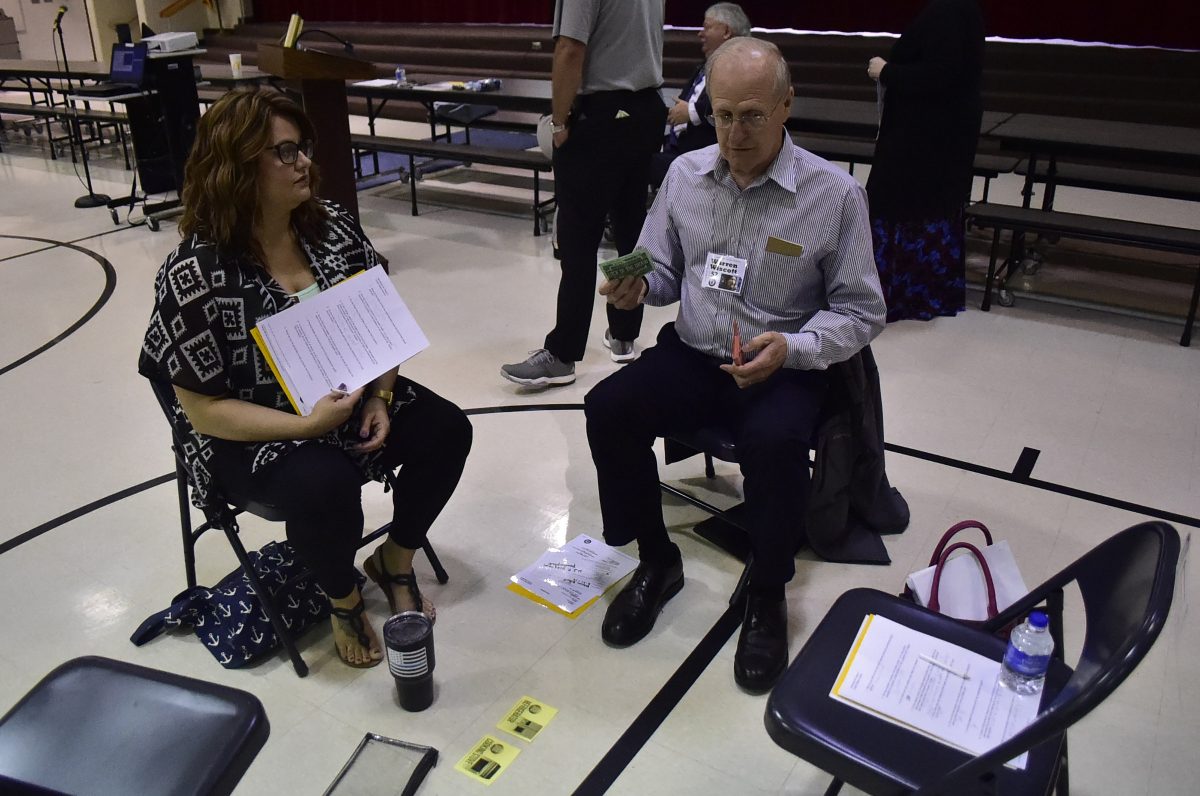
Robert Myers is a retired chief executive officer of Kocolene Development Corp., where he worked for 47 years.
But on Thursday, the 78-year-old Seymour resident was an 8-year-old boy, the youngest in a family of five.
Myers and 75 other people participated in Rethink Poverty: Real Life. Real Choices.
[sc:text-divider text-divider-title=”Story continues below gallery” ]
Click here to purchase photos from this galleryThe purpose of the event is to promote poverty awareness, increase understanding and inspire local change.
The program was organized by Jackson County United Way and the Community Foundation of Jackson County. Representatives from Leadership Jackson County, Centerstone, Schneck Medical Center, Human Services, Inc., Cummins, Jackson County Purdue Extension, Kocolene Development Corp., Jackson County Education Coalition, Jackson County Industrial Development Corporation, Jackson County Learning Center, The Pardieck Law Firm and Seymour Community Schools also helped organize it.
The organizations plan to offer the program twice a year after the Community Foundation of Jackson County purchased the kit through a Lilly Endowment grant.
The grant also funded training for volunteers and is expected to fund other events and programs associated with poverty alleviation.
Participants and 34 volunteers gathered at Seymour-Jackson Elementary School for the program, which was a simulation of a month for a family in poverty.
Participants were grouped together and assigned different roles in a scenario. For Myers, he had an unemployed father and a mother who worked for $9 an hour. He also had older siblings.
Those families were assigned different circumstances based on real situations families in poverty have faced or are facing. Some groups had two parents with teenagers. Others were grandparents raising grandchildren or single parents raising children.
Stations were set up in the school’s gymnasium to form a community. The community included a place of employment, a social services agency, faith-based organizations, a school, a bank, a police station, a grocery store, a pawn shop and more.
Groups had 15 minutes, representing a week, to pay bills, apply for benefits and jobs, transport children and complete other tasks based on what they could afford.
Volunteers helped run the stations and would deny requests or give help when they could. At times, other volunteers would hand out cards that would change the family’s circumstances in a positive or negative way to simulate unforeseen issues. That may be an eviction notice or a friend paying back a loan.
Many groups reported a different outlook following the simulation. Stress, anxiety, frustration, hopeless and defeated were terms groups used during a debriefing discussion.
That’s exactly what the program was designed to do, said Tonja Couch, executive director of Jackson County United Way who helped lead the simulation.
“Our intention today was to help people become sensitized to the issue of poverty,” she said. “I think we wanted to have something to at least build empathy.”
Dan Davis, president of the Community Foundation of Jackson County, said there are so many parts to poverty and its effect on a variety of issues is wide ranging.
“It just seems like just affects so many things like theft, drugs, alcohol, bad health and more,” he said. “We want to bring people together and try to do something moving forward.”
Davis said the initiative fits in well with the foundation’s goal of building a better future for the community.
Couch said the three organizations would like to conduct simulations twice a year. The goal is to form a 10-year plan to help the community combat poverty.
That means they will rely upon volunteers, which they viewed the participants as, to become advocates to work on solutions to make that goal a reality. She said it also will take many groups to come together to solve the problem.
“To do this, we have to have the community buy in,” she said. “We can only do that if nonprofits work together, the faith-based sector comes together, if for-profit industry leaders take a role and a role from our government leaders.”
Myers said he really tried to think like the person he was assigned. He was moved when he thought about being 8 years old and being evicted from a home with no place to go.
“That was a tremendously scary situation being out on the street,” he said.
Myers said the family had nowhere to go and were left on their own without any protection from harm.
“That feeling will stay with me forever,” he said.
While Myers is familiar with poverty issues through his work at Coaching for Success with Missy Woods of Human Services, he said he learned the amount of time it takes people in poverty to complete something.
“Dad needed a job but had to fill out an application and wait and was told for a reason he had to wait, same at other places for assistance,” he said. “The time it takes just to do something was so long, especially if you wouldn’t have transportation.”
The Coaching for Success program mentors people to help make better decisions and remove barriers for getting ahead.
Couch said that kind of commitment is what it will take to help put their plan into action to help alleviate poverty. Some of those steps are simple, like being an advocate.
“Send a legislator a message, post on social media, encourage people and become involved in organizations is something everyone can do,” she said.
Some of the more committed steps to further the cause will require more boots on the ground like Myers.
“Rolling up your sleeves and getting into the work side by side with someone and mentoring them on the journey, that’s a little more challenging,” she said. “I hope today called people to that empathy and will bring them to action.”
Based on the call-to-action forms received following the event, Couch felt as though a strong base for a group to help solve the issue was formed.
“We want to move families to financial stability,” she said.
